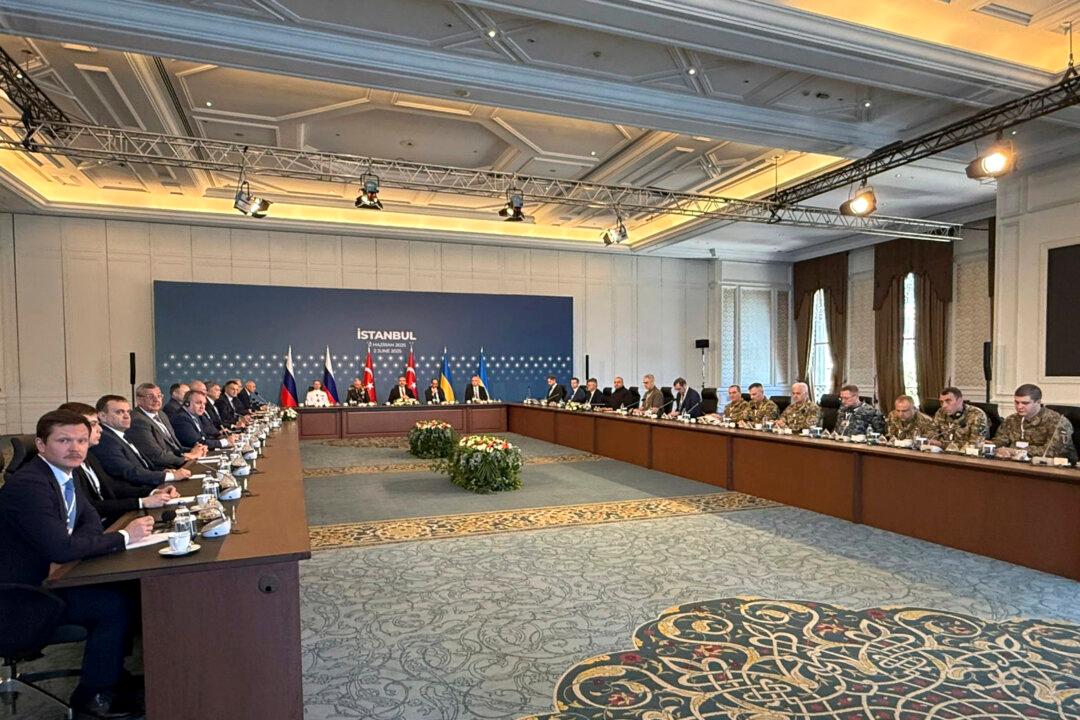Delegations from Ukraine and Russia ended their second round of cease-fire negotiations in Turkey after just an hour.
Ukrainian President Volodymyr Zelenskyy said on June 2 that the two sides were preparing for a new prisoner swap, and the Ukrainian delegation delivered a list of deported Ukrainian children to Russia that Kyiv wants returned home.
The previous round of direct talks in May also led to a swap of prisoners, with 1,000 on both sides being exchanged.
Turkish Foreign Minister Hakan Fidan said before the talks began that the aim of the June 2 meeting, the second of its kind, was to evaluate the two sides’ conditions for a cease-fire, to facilitate more prisoner exchanges, and to discuss a possible meeting between the Russian and Ukrainian presidents.
“The eyes of the whole world are focused on the contacts here,” Fidan said.
Ukrainian Defense Minister Rustem Umerov led negotiations for Kyiv, and Russian presidential aide Vladimir Medinsky headed the Kremlin team.
He noted that Ukraine had delivered its conditions to Russia days in advance of the talks but received nothing from Russia until June 2.
Kyiv will now take a week to review Moscow’s demands, according to Umerov.
He said real peace talks could only take place at the level of national leadership and welcomed the involvement of foreign leaders in the process, including the president of the United States.
“This war must end, and the whole world supports us in that,” Umerov said.
The brief talks in Istanbul, Turkey, came shortly after a string of Ukrainian drone attacks on Russian airbases, which Kyiv claims destroyed or damaged a significant portion of Russia’s strategic bomber fleet, striking at the heart of Moscow’s ability to deliver nuclear payloads.
Speaking on June 2, Zelenskyy said he believed that Russia would prove more willing to negotiate if it took more such losses.
“Russia must feel what its losses mean. That is what will push it toward diplomacy,” he said.
The wide-reaching attack struck targets in multiple time zones, including an airbase more than 2,500 miles from Ukraine, and utilized smuggled commercial drones launched from trucks parked near the bases.
On June 1, Russia retaliated by firing 472 drones into Ukrainian territory, including at civilian targets, in an apparent effort to overwhelm the embattled nation’s air defenses.
That escalation follows Moscow’s continued refusal to agree to U.S. President Donald Trump’s demands for an immediate cease-fire for peace talks to take place.
While Zelenskyy has accepted Trump’s demand, Russian President Vladimir Putin has instead issued a series of ever-changing demands and refused to commit to a cease-fire.
Among those demands is that Ukraine surrender four of its eastern territories to Russia, even though Russian troops have failed to seize the territory themselves after three years of full-scale war.
The territories Russia seeks to control include Donetsk, Kherson, Luhansk, and Zaporizhia, which Putin claimed to have annexed in 2022 but which Russia still does not completely control.
That uprising began a brutal guerrilla war that lasted until Moscow launched its full-scale invasion in 2022.
Vance said Washington would continue to issue demands to both sides every few weeks and would expect both Moscow and Kyiv to comply.
If Washington determined that either side was acting wholly in bad faith and unwilling to engage in the peace process, it would walk away from cease-fire efforts and let the two nations fight it out, he said.
U.S. lawmakers have also warned Russia that it could face new U.S. sanctions if it doesn’t proceed in good faith.







